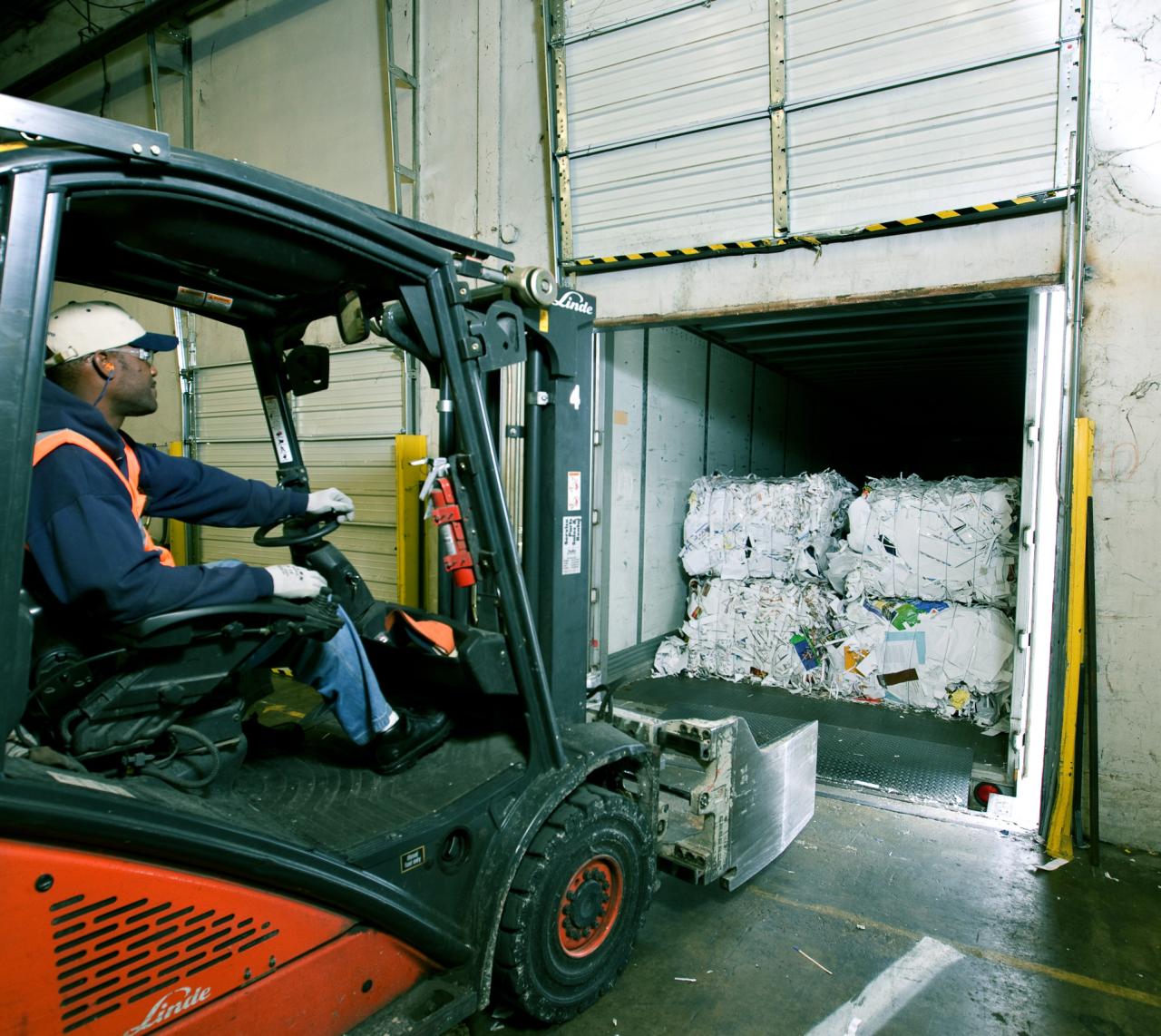Embracing Circularity: International Paper’s Sustainable Resource Strategy
Rhea-AI Summary
International Paper's 2023 Sustainability Report outlines the company's commitment to circularity as a key strategy. This approach prioritizes renewable, sustainably managed, recycled, and reused resources throughout their value chain. The company focuses on four pillars:
1. Using every part of the tree, including selling pine chemicals.
2. Sourcing sustainable raw materials, with 5.2 million tons of recovered fiber used annually.
3. Implementing circular manufacturing processes, with 48% of manufacturing waste diverted for beneficial uses in 2023.
4. Creating innovative products designed for sustainability and easy recycling.
IP also partners for IT circularity, remarketing over 2,500 systems and recycling 183,389 pounds of assets in 2023. The company collaborates with customers and partners to develop circular, low-carbon solutions, emphasizing the sustainability benefits of fiber-based packaging.
Positive
- International Paper uses 5.2 million tons of recovered fiber annually for new products
- 48% of manufacturing waste was diverted from disposal for beneficial uses in 2023
- Remarketed over 2,500 IT systems and recycled 183,389 pounds of assets in 2023
- Plans to scale capabilities to sell 100% of pine chemicals by 2027
Negative
- None.
News Market Reaction
On the day this news was published, IP declined 1.13%, reflecting a mild negative market reaction.
Data tracked by StockTitan Argus on the day of publication.
Originally published in International Paper's 2023 Sustainability Report
NORTHAMPTON, MA / ACCESSWIRE / September 25, 2024 / International Paper Company
Our approach: Circularity at International Paper
Circularity is a key strategy for International Paper. It means that we prioritize the use of resources that are renewable, sustainably managed, recycled and reused through design, production and recovery across our value chain. For International Paper, circularity begins in the forest, where we encourage sustainable forest management and continual improvement in growing, harvesting and processing practices. This carries through to our mills where we use this renewable material and give used fiber products new life.
Circularity means recovering and reusing as much wood fiber, energy, water and other materials as possible in a continual cycle from natural resource to finished product and back again. Likewise, it means keeping as much material as possible from becoming waste destined for landfills.
Circularity also touches on product design, as engineers work to improve product quality and capability, while reducing waste and increasing the amount of recycled material that is used.
Embracing the circular economy means looking throughout our value chain for opportunities to optimize and improve our operations. In this regard, International Paper has a unique position in the market as one of the world's largest stewards of wood and recovered fiber. As both a producer of fiber-based products and a consumer of recovered fiber, we have a marked impact on the overall circularity of our industry.
Partnering for IT circularity
IP is also committed to green computing. Our IT team has a zero-landfill policy for end-of-life electronics. We partner with Dynamic Lifecycle Innovations to remarket our old electronic equipment for reuse or, where that's not possible, recycle defunct devices. This partnership includes computers, servers, hard drives, monitors and miscellaneous equipment. In 2023, we remarketed over 2,500 systems and recycled 183,389 pounds of assets. That's the equivalent to taking 95 passenger vehicles off the road for a year.
The four key pillars of circularity at International Paper
To achieve our Renewable Solutions goal, we've implemented a circularity strategy made up of four pillars. These pillars help guide how we think about our impact across our value chain and identify implementation tactics within each of our businesses that advance circular solutions.
Using every part of the tree
One way that we integrate sustainability into our operations is by selling high-quality pine chemicals. These materials come from pine trees and are a byproduct of the kraft pulping process, which can be used to make a variety of everyday goods such as biofuels, fragrances, cleaners and ink. Their small carbon footprints make these pine chemicals an eco-friendly alternative to the petroleum-based materials used by the chemical industry. With demand for some pine chemicals exceeding supply and expected to grow, we plan to rapidly scale our capabilities so we can sell
Source sustainable raw materials
International Paper's primary raw material is, of course, fiber. And this is where our sustainability strategy begins. We source both recycled and new, renewable fiber from trees grown in sustainably managed forests. Wherever possible, we use renewable, sustainable or recycled materials - fibers, chemicals, packaging, etc. - across our manufacturing process.
Our commitment to using sustainable raw materials aligns with a core principle of circularity: regenerating natural systems. In a nutshell, since our products are made from renewable resources, they replace less sustainable, carbon-intensive nonrenewable alternatives.
Every year, our operations use 5.2 million tons of recovered fiber to make new fiberbased products, making International Paper one of the world's largest users of recovered fiber.
Use circular manufacturing processes
Circularity is at the heart of what we do at International Paper. Within our manufacturing process, this is done by designing for sustainability, minimizing waste and maximizing the recovery and reuse of materials.
By becoming more circular, designing in efficiency, and improving our environmental impact, we reduce our greenhouse gas emissions and contribute to a sustainable low-carbon future. In 2023,
Create innovative products
International Paper products make a significant contribution to a low-carbon circular economy. We think about the entire lifecycle of the product and how changes in product design impact decisions along its value chain. The result is products that are:
Made efficiently and sustainably, from sourcing to production to transportation
Designed with end of life in mind
Easily recovered, recycled, reused or composted
Our product strategy is informed by the Ellen MacArthur Foundation, the world's leading circular economy network. Through our membership, we're working with the Foundation and its partners to advance our contributions to circular lowcarbon solutions.
Learn more about our 2023 product innovations here.
Collaborate on solutions
Collaboration across our value chain is key to our success. That's why we team up with our customers, supply chain partners and thought leaders to develop innovative ideas and gather diverse points of view. The teams at our research and development centers are at the forefront of these creative solutions.
The circular solutions we create together not only respond to changing market conditions and consumer demands, but also have multiple lives through repeated cycles of reuse, recovery and recycling. Learn more about some of our 2023 collaborations here.
The sustainability benefits of fiber-based packaging
Fiber-based packaging:
is made from a renewable resource
so it is composed of both recycled and new fiber grown in sustainably managed forests. Using paper packaging reduces the reliance on non-renewable resources, like fossil fuels, and promotes sustainable practices.
is easy to recycle
so it can be turned into new paper products. Recycling paper ensures a valuable renewable material is recovered and reused, reducing waste going into landfills
is lightweight
so it can lower freight and handling costs with fewer trucks on the roads, less fuel used and lower emissions from transportation.
has a lower carbon footprint
so it has a smaller impact on the climate. The production process of paper involves fewer chemicals and energy than other packaging, which means that it generates fewer greenhouse gas emissions.
keeps forests working
so they can continue to conserve biodiversity and provide clean air and water for communities. Responsibly grown, managed and harvested forests provide a sustainable supply of fiber for products, while ensuring forestland remains forested.
About International Paper
International Paper (NYSE: IP) is a global producer of sustainable packaging, pulp and other fiber-based products, and one of the world's largest recyclers. Headquartered in Memphis, Tenn., we employ approximately 39,000 colleagues globally who are committed to creating what's next. We serve customers worldwide, with manufacturing operations in North America, Latin America, North Africa and Europe. Net sales for 2023 were
About International Paper - EMEA
In Europe, Middle East & Africa (EMEA), International Paper focuses on the production and marketing of fiber-based packaging and specialty pulp, employing approximately 4,400 people. As a leading supplier of high-quality corrugated containers for a multitude of applications, we serve customers throughout the region from our network of two recycled containerboard mills and 23 box plants in France, Italy, Morocco, Portugal and Spain. Specialty pulp is made in Gdansk, Poland. Other products available from International Paper in the region include a variety of Kraft linerboard and other pulp products.

Contact Info:
Spokesperson: International Paper Company
Website: https://www.3blmedia.com/profiles/international-paper-company
Email: info@3blmedia.com
SOURCE: International Paper Company
View the original press release on accesswire.com







